The Yearly Cycle
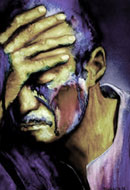 Among the Mourners of Zion
Among the Mourners of ZionWednesday, April 11, 2012 by Micah Stein | Jewish Ideas Daily » Daily Features
We are a nation of mourners this month, collectively observing the Jewish rituals of grief in memory of . . . well, something or other. The occasion for mourning is the Omer, which began on Saturday night; the reason for mourning is more mysterious.
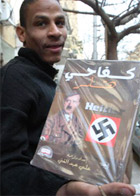 Whose Holocaust?
Whose Holocaust?Friday, January 27, 2012 by Margot Lurie | Jewish Ideas Daily » Daily Features
For much of Europe, today is the UN-designated International Holocaust Remembrance Day. Secretary-General Ban Ki-moon has dedicated his address this year to children murdered by the Nazis, with the message that "the best tribute to the memory of these children is an ongoing effort to teach the universal lessons of the Holocaust, so that no such horror is visited upon future generations."
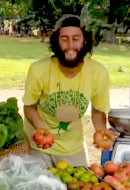 Eating Your Values
Eating Your ValuesFriday, November 4, 2011 | Jewish Ideas Daily » Daily Features
The many Jewish laws regarding food—how it gets from the ground and into our mouths in a kosher manner—are central to Jewish life. But what ethical framework underlies the system of kashrut? Maimonides' justifications for kashrut range from avoiding cruelty to animals and eschewing the idolatrous practices of antiquity to considerations of health.
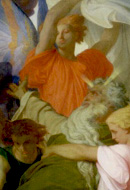 The End of the Torah
The End of the TorahMonday, October 17, 2011 by Michael Carasik | Jewish Ideas Daily » Daily Features
The Torah begins with a bang—the Big Bang, the creation of the universe. But it ends with a whimper, albeit a whimper concealed by a very loud noise of another kind. Let me explain.
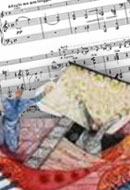 Jonah and the Music of Yom Kippur
Jonah and the Music of Yom KippurThursday, October 6, 2011 by Michael Carasik | Jewish Ideas Daily » Daily Features
Leviticus 10 tells us that Aaron's sons Nadav and Avihu died for bringing "strange fire" before the Lord in the wilderness. As a result of their deaths, according to Leviticus 16, God instructed Moses to ordain an annual Day of Atonement.
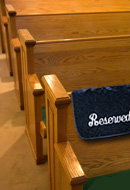 Pay to Pray?
Pay to Pray?Wednesday, September 28, 2011 by Jack Wertheimer | Jewish Ideas Daily » Daily Features
In the middle decades of the 20th century they were called "mushroom synagogues." They popped up in the waning days of summer to provide High Holiday services, then disappeared at the conclusion of Yom Kippur. Today, "mushroom synagogues" are once again in vogue—but with a critical difference.
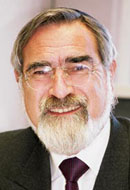 Rosh Hashanah with the Chief Rabbi
Rosh Hashanah with the Chief RabbiTuesday, September 20, 2011 by Lawrence Grossman | Jewish Ideas Daily » Daily Features
Ten years ago, the first day of Rosh Hashanah—the two-day Jewish New Year—fell on September 18. That was one week after September 11, 2001, when almost 3,000 people were killed by Muslim terrorists. On that Rosh Hashanah, rabbis did not lack for sermon topics.
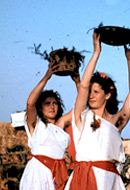 The Forgotten Festival
The Forgotten FestivalMonday, June 6, 2011 by Michael Carasik | Jewish Ideas Daily » Daily Features
The holiday of Shavuot, which begins this year on Tuesday evening, is the orphan among Jewish holidays; it is the forgotten festival. Let me count the ways.
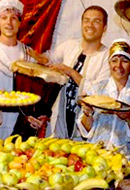 Mimouna!
Mimouna!Friday, May 13, 2011 by Aryeh Tepper | Jewish Ideas Daily » Daily Features
What did two million Israelis do when Passover ended this year? As in previous years, they celebrated Mimouna, a Moroccan Jewish holiday that is popularly observed by picnicking, barbecueing, and consuming moufletas (sweet North African pancakes). And what is Mimouna all about? No one really knows.
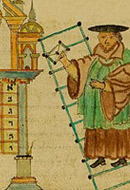 Telling Jewish Time
Telling Jewish TimeMonday, April 11, 2011 by Allan Nadler | Jewish Ideas Daily » Daily Features
The most acclaimed Jewish Bible commentary opens with a question. Why, asks Rashi (1040–1105), does the Torah begin with the account of creation, when it should properly have begun with God's revelation of His very first law to Moses on the eve of the Exodus from Egypt: "This month shall be for you the first of months"?
Editors' Picks
There's a Key in My Challah! Jeffrey Saks, Torah Musings. Does the post-Passover tradition known as "shliss challah" derive from symbolic readings of the season's texts—or, rather, is it a Christian symbol of Jesus rising in the dough?
Hitler and Pharaoh Jeff Jacoby, Boston Globe. The nexus of Passover and Yom Hashoah teaches a single lesson—that persecution of Jews was preceded by the persecutors' sense of victimhood.
Trailing the Rabbis' Breadcrumbs Judith Shulevitz, Tablet. What is man? He who is capable of searching inside himself. What does he search for? Some dark or foreign matter that he has put there himself. With what does he search? The light of God, which is also in himself.
And It Came to Pass at Midnight Michael Pitkowsky, Menachem Mendel. Audio and video of several renditions of "Karev Yom," a Byzantine-era piyyut sung at the end of the seder.
What Passover Sounded Like 370 Years Ago Fred MacDowell, On the Main Line. Musical notation for two end-of-seder songs in a 17th-century Haggadah is brought to life in a Toronto Jewish high school. (Video)
Making a Hash of the Haggadah Michael Medved, Commentary. The impulse to revise and update the prescribed Passover service remains unquenchable, yielding results that range from the odd to the preposterous.
A Series of Unfortunate Segments Leon Wieseltier, Jewish Review of Books. There is immodesty in the notion that newness, and one's own signature, will suffice. The New American Haggadah is abundantly a labor of love, but love is not enough.
Freedom Tales Yehudah Mirsky, Jewish Ideas Daily. From a medieval manuscript to the script for an interfaith seder, a new crop of Haggadot shows that the old words still hold their own.
Go Ahead, Buy that Train Set Dennis Prager, Jewish Journal. A holiday season defense of material pleasures.
Hanukkah (from "Meditations on the Fall and Winter Holidays") Charles Reznikoff, Poems of Charles Reznikoff. Go swiftly in your chariot, my fellow Jew,you who are blessed with horses;and I will follow as best I can afoot,bringing with me perhaps a word or two.Speak your learned and witty discoursesand I will utter my word or two— not by might not by powerbut by Your Spirit, Lord.

